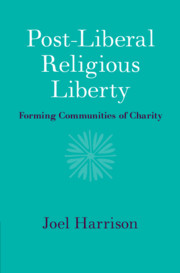Book contents
- Post-Liberal Religious Liberty
- Post-Liberal Religious Liberty
- Copyright page
- Dedication
- Epigraph
- Contents
- Acknowledgements
- Table of Cases
- 1 Introduction
- 2 The Liberal Egalitarian Account
- 3 Secularisation Challenged
- 4 Modern (Christian) Responses
- 5 The Ecclesiological Account
- 6 Pluralism and Disagreement
- 7 Conclusion
- Select Bibliography
- Index
3 - Secularisation Challenged
Published online by Cambridge University Press: 06 July 2020
- Post-Liberal Religious Liberty
- Post-Liberal Religious Liberty
- Copyright page
- Dedication
- Epigraph
- Contents
- Acknowledgements
- Table of Cases
- 1 Introduction
- 2 The Liberal Egalitarian Account
- 3 Secularisation Challenged
- 4 Modern (Christian) Responses
- 5 The Ecclesiological Account
- 6 Pluralism and Disagreement
- 7 Conclusion
- Select Bibliography
- Index
Summary
In Of True Religion, Augustine writes that true religion consists in worshipping the one God, ‘acknowledged with purest piety to be the beginning of all existing things, originating, perfecting and containing the universe’.1 This he contrasts with both pagan worship – the worship of created things – and the worship of vice. For Augustine, worship entails orienting one’s being. The person, in his or her ultimate love, is either directed towards God, the source and sustainer of all creation, or else the empty ‘nothing’ of mere transitory creation.2 This was not a matter of a mere set of beliefs. Augustine describes religion as a ‘binding’.3 In this he echoes the Roman usage, in which religio referred to cultic observances and social obligations. Religio was related to religare, meaning ‘to bind up’ or ‘to bind together’.4 True religion thus meant cultivating through practices a life habitually oriented to God. Nor for Augustine is true religion a matter simply for the individual, or else a domain isolated from political life. Again, in Of True Religion, Augustine writes that true religion entails a body of people – the Church catholic – that acts as the ‘guardians of truth and followers of right’. And this body, he continues, ‘makes use of the nations as material for its operations’.5 Indeed, Augustine considers that the ruler must love perfect justice and thus render what is due to God. This means the ruler is exhorted to ‘cleave to God, the sole ruler of all things’.6
- Type
- Chapter
- Information
- Post-Liberal Religious LibertyForming Communities of Charity, pp. 59 - 99Publisher: Cambridge University PressPrint publication year: 2020

